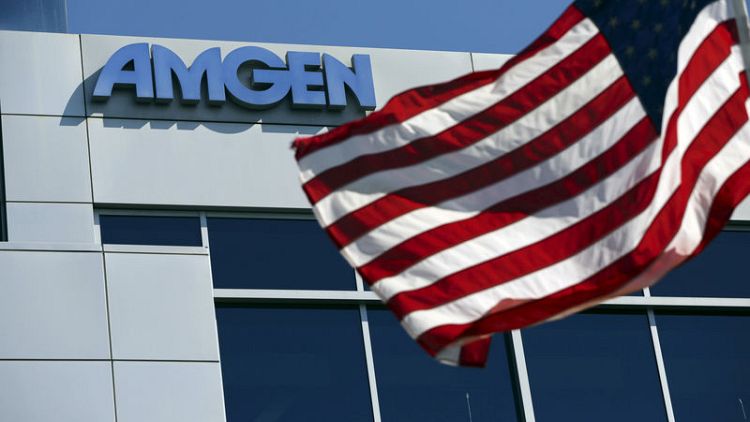By Deena Beasley
(Reuters) - Amgen Inc on Tuesday reported fourth-quarter profit that easily surpassed expectations as sales rose and tax expense fell, but competition for older medicines is growing and the drugmaker forecast 2019 earnings below Wall Street estimates.
Shares of Amgen, the world's largest biotechnology company, were down 2.6 percent at $187 in after-hours trading.
For the full-year, Amgen projected adjusted earnings of $13.10 to $14.30 per share on revenue of $21.8 billion (£16.6 billion) to $22.9 billion. Wall Street analysts, on average, had forecast $14.61 per share on revenue $22.9 billion, according to IBES data from Refinitiv.
Amgen's forecast appears to be part of an emerging trend among large drugmakers. Earlier on Tuesday, Pfizer Inc issued a 2019 earnings forecast well below Wall Street estimates. That followed lower-than-expected initial full-year earnings outlooks from Johnson & Johnson and Bristol-Myers Squibb Co.
Excluding items, Thousand Oaks, California-based Amgen posted adjusted quarterly earnings of $3.42 per share, topping analysts' average expectations by 15 cents.
Revenue for the quarter rose 7 percent to $6.23 billion, beating the average analyst estimate of $5.84 billion.
"The fourth quarter was a very strong result," said Jefferies analyst Michael Yee.
"The (2019) guidance reflects an expected year of uncertainty and some lack of visibility" regarding competition from cheaper biosimilar versions of white-blood cell booster Neulasta and rheumatoid arthritis drug Enbrel - Amgen's two biggest-selling products.
However, Yee noted that Amgen has historically issued conservative financial forecasts at the beginning of the year, before raising them each quarter as actual results are reported.
The increase in Amgen's fourth quarter sales was driven largely by increased demand for medicines such as cancer drug Kyprolis, cholesterol fighter Repatha and osteoporosis treatment Prolia.
Sales of new migraine drug Aimovig totalled $95 million for the quarter, nearly double the $50 million analysts had forecast. Aimovig was first-to-market among a new class of drugs designed to prevent rather than treat migraine headaches.
(Reporting By Deena Beasley; Editing by Bill Berkrot)



